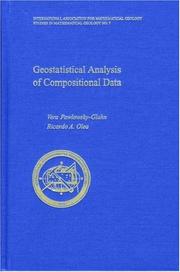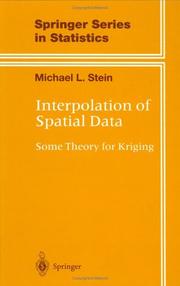| Listing 1 - 10 of 46 | << page >> |
Sort by
|
Book
ISBN: 0198741804 9780198741800 Year: 1994 Publisher: Oxford : New York : Clarendon Press Oxford University Press,
Abstract | Keywords | Export | Availability | Bookmark
 Loading...
Loading...Choose an application
- Reference Manager
- EndNote
- RefWorks (Direct export to RefWorks)
This book gives a comprehensive view of non-linear geostatistics, from the first work by G. Matheron and A. Maréchal in the 1970s, to the latest developments related to geometric problems. The course notes, which form the first part of the book, correspond to the course on non-linear geostatistics for the CFSG, a postgraduate program in geostatistics offered by the Centre de Géostatique de Fontainebleau (École des Mines de Paris). In the second part of the book, three case-studies illustrate the subject.
Kriging --- Kriging. --- Basic Sciences. Statistics --- Applied Statistics --- Geology --- Mine valuation --- Nonlinear theories --- Statistical methods --- Applied Statistics.

ISBN: 0792385233 Year: 1999 Publisher: Boston (Mass.) : Kluwer academic,
Abstract | Keywords | Export | Availability | Bookmark
 Loading...
Loading...Choose an application
- Reference Manager
- EndNote
- RefWorks (Direct export to RefWorks)
Basic Sciences. Statistics --- Geology --- Kriging. --- Applied Statistics. --- Statistical methods.
Book
ISBN: 9781118413180 1118413180 Year: 2015 Publisher: Chichester John Wiley & Sons, Ltd
Abstract | Keywords | Export | Availability | Bookmark
 Loading...
Loading...Choose an application
- Reference Manager
- EndNote
- RefWorks (Direct export to RefWorks)
Geology. Earth sciences --- Mathematical statistics --- Geology --- Kriging --- Statistical methods --- Geology - Statistical methods

ISBN: 0195171667 Year: 2004 Publisher: Oxford [etc.] : Oxford University Press,
Abstract | Keywords | Export | Availability | Bookmark
 Loading...
Loading...Choose an application
- Reference Manager
- EndNote
- RefWorks (Direct export to RefWorks)
1. Introduction. 2. Regionalized Compositions. 3. Spatial Covariance Structure. 4. Concepts of Null Correlation. 5. Cokriging. 6. Practical Aspects of Compositional Data Analysis. 7. Application to Real Data. Summary and Prospects. References. Index
Geology --- Kriging. --- Multivariate analysis. --- Environmental Sciences and Forestry. Geology --- Statistical methods. --- Geology (General).
Book
ISBN: 9781119387848 Year: 2022 Publisher: Hoboken, NJ : Wiley,
Abstract | Keywords | Export | Availability | Bookmark
 Loading...
Loading...Choose an application
- Reference Manager
- EndNote
- RefWorks (Direct export to RefWorks)
"Spatial functional data (SFD) arises when we have functional data (curves or images) at each one of the several sites or areas of a region. Statistics for SFD is concerned with the application of methods for modeling this type of data. All the fields of spatial statistics (point patterns, areal data and geostatistics) have been adapted to the study of SFD. For example, in point patterns analysis, the functional mark correlation function is proposed as a counterpart of the mark correlation function; in areal data, analysis of a functional areal dataset consisting of population pyramids for 38 neighborhoods in Barcelona (Spain) has been proposed; and in geostatistical analysis diverse approaches for kriging of functional data have been given. In the last few years, some alternatives have been adapted for considering models for SFD, where the estimation of the spatial correlation is of interest. When a functional variable is measured in sites of a region, i.e. when there is a realisation of a functional random field (spatial functional stochastic process), it is important to test for significant spatial autocorrelation and study this correlation if present. Assessing whether SFD are or are not spatially correlated allows us to properly formulate a functional model. However, searching in the literature, it is clear that amongst the several categories of spatial functional methods, functional geostatistics has been much more developed considering both new methodological approaches and analysis of a wide range of case studies covering a wealth of varied fields of applications"--
Geology --- Géostatistique --- Kriging. --- Spatial analysis (Statistics) --- Analyse spatiale (statistique) --- Functional analysis. --- Analyse fonctionnelle --- Statistical methods. --- Géostatistique

ISBN: 0197565514 1280843764 0198038313 9780198038313 0195171667 9780195171662 Year: 2004 Publisher: New York : Oxford University Press,
Abstract | Keywords | Export | Availability | Bookmark
 Loading...
Loading...Choose an application
- Reference Manager
- EndNote
- RefWorks (Direct export to RefWorks)
Geostatistical Analysis of Compositional Data provides a comprehensive coverage of the theory and practice of analysis of data that have both spatial and compositional dependence, characteristics of most earth science and environmental measurements.
Geology --- Multivariate analysis. --- Kriging. --- Mine valuation --- Nonlinear theories --- Multivariate distributions --- Multivariate statistical analysis --- Statistical analysis, Multivariate --- Analysis of variance --- Mathematical statistics --- Matrices --- Geological statistics --- Geostatistics --- Statistical methods. --- Statistical methods
Book
Year: 2021 Publisher: Basel, Switzerland MDPI - Multidisciplinary Digital Publishing Institute
Abstract | Keywords | Export | Availability | Bookmark
 Loading...
Loading...Choose an application
- Reference Manager
- EndNote
- RefWorks (Direct export to RefWorks)
Coastal ecosystems are dynamic, complex, and often fragile transition environments between land and oceans. They are exclusive habitats for a broad range of living organisms, functioning as havens for biodiversity and providing several important ecological services that link terrestrial, freshwater, and marine environments. Humans living in coastal zones have been strongly dependent on these ecosystems as a source of food, physical protection against storms and advancing sea, and a range of human activities that generate economic income. Notwithstanding, the intensification of human activities in coastal areas of the recent decades, as well as the global climatic changes and coastal erosion processes of the present, have had detrimental impacts on these environments. Maintaining the structural and functional integrity of these environments and recovering an ecological balance or mitigating disturbances in systems under the influence of such stressors are complex tasks, only possible through the implementation of monitoring programs and by assessing their environmental quality. In this book, distinct approaches to environmental quality monitoring and assessment of coastal environments are presented, focused on abiotic and biotic compartments, and using tools that range from ecological levels of organization to the sub-organismal and the ecosystem levels.
Research & information: general --- Environmental economics --- radioactive materials --- trace metals --- bioaccumulation --- marine fish --- crustaceans --- marine environmental pollution --- Bay of Bengal --- beach litter --- infrared thermography --- UAV --- UGV --- environmental monitoring --- coastal pollution --- fuzzy modelling --- marine sediment --- Takagi–Sugeno --- ordinary kriging (OK) --- inverse distance weighting (IDW) --- spatial predictions --- endocrine disruptors --- Mugil cephalus --- PFNA --- ecosystem services --- benefit transfer --- meta-analysis --- meta-regression function
Book
Year: 2021 Publisher: Basel, Switzerland MDPI - Multidisciplinary Digital Publishing Institute
Abstract | Keywords | Export | Availability | Bookmark
 Loading...
Loading...Choose an application
- Reference Manager
- EndNote
- RefWorks (Direct export to RefWorks)
Coastal ecosystems are dynamic, complex, and often fragile transition environments between land and oceans. They are exclusive habitats for a broad range of living organisms, functioning as havens for biodiversity and providing several important ecological services that link terrestrial, freshwater, and marine environments. Humans living in coastal zones have been strongly dependent on these ecosystems as a source of food, physical protection against storms and advancing sea, and a range of human activities that generate economic income. Notwithstanding, the intensification of human activities in coastal areas of the recent decades, as well as the global climatic changes and coastal erosion processes of the present, have had detrimental impacts on these environments. Maintaining the structural and functional integrity of these environments and recovering an ecological balance or mitigating disturbances in systems under the influence of such stressors are complex tasks, only possible through the implementation of monitoring programs and by assessing their environmental quality. In this book, distinct approaches to environmental quality monitoring and assessment of coastal environments are presented, focused on abiotic and biotic compartments, and using tools that range from ecological levels of organization to the sub-organismal and the ecosystem levels.
radioactive materials --- trace metals --- bioaccumulation --- marine fish --- crustaceans --- marine environmental pollution --- Bay of Bengal --- beach litter --- infrared thermography --- UAV --- UGV --- environmental monitoring --- coastal pollution --- fuzzy modelling --- marine sediment --- Takagi–Sugeno --- ordinary kriging (OK) --- inverse distance weighting (IDW) --- spatial predictions --- endocrine disruptors --- Mugil cephalus --- PFNA --- ecosystem services --- benefit transfer --- meta-analysis --- meta-regression function

ISBN: 0387986294 1461271665 1461214947 Year: 1999 Publisher: New York : Springer,
Abstract | Keywords | Export | Availability | Bookmark
 Loading...
Loading...Choose an application
- Reference Manager
- EndNote
- RefWorks (Direct export to RefWorks)
Prediction of a random field based on observations of the random field at some set of locations arises in mining, hydrology, atmospheric sciences, and geography. Kriging, a prediction scheme defined as any prediction scheme that minimizes mean squared prediction error among some class of predictors under a particular model for the field, is commonly used in all these areas of prediction. This book summarizes past work and describes new approaches to thinking about kriging.
Stochastic processes --- Kriging. --- Geografie --- Topografie --- Geometric Modelling. --- Probabilities. --- Statistics . --- Geology. --- Geography. --- Earth sciences. --- Probability Theory and Stochastic Processes. --- Statistical Theory and Methods. --- Statistics for Engineering, Physics, Computer Science, Chemistry and Earth Sciences. --- Geography, general. --- Earth Sciences, general. --- Geosciences --- Environmental sciences --- Physical sciences --- Cosmography --- Earth sciences --- World history --- Geognosy --- Geoscience --- Natural history --- Statistical analysis --- Statistical data --- Statistical methods --- Statistical science --- Mathematics --- Econometrics --- Probability --- Statistical inference --- Combinations --- Chance --- Least squares --- Mathematical statistics --- Risk
Book
ISBN: 0691220123 Year: 2007 Publisher: Princeton, New Jersey ; Oxfordshire, England : Princeton University Press,
Abstract | Keywords | Export | Availability | Bookmark
 Loading...
Loading...Choose an application
- Reference Manager
- EndNote
- RefWorks (Direct export to RefWorks)
The environmental sciences are undergoing a revolution in the use of models and data. Facing ecological data sets of unprecedented size and complexity, environmental scientists are struggling to understand and exploit powerful new statistical tools for making sense of ecological processes. In Models for Ecological Data, James Clark introduces ecologists to these modern methods in modeling and computation. Assuming only basic courses in calculus and statistics, the text introduces readers to basic maximum likelihood and then works up to more advanced topics in Bayesian modeling and computation. Clark covers both classical statistical approaches and powerful new computational tools and describes how complexity can motivate a shift from classical to Bayesian methods. Through an available lab manual, the book introduces readers to the practical work of data modeling and computation in the language R. Based on a successful course at Duke University and National Science Foundation-funded institutes on hierarchical modeling, Models for Ecological Data will enable ecologists and other environmental scientists to develop useful models that make sense of ecological data. Consistent treatment from classical to modern Bayes Underlying distribution theory to algorithm development Many examples and applications Does not assume statistical background Extensive supporting appendixes Accompanying lab manual in R
Environmental sciences --- Ecology --- Mathematical models. --- Mathematical models. --- Dirichlet distribution. --- Fisher Information. --- Hadamard product. --- Poisson. --- Weibull distribution. --- autocorrelation. --- autocovariance. --- beta distribution. --- beta-binomial. --- binomial distribution. --- completing the square. --- confidence interval. --- correlation. --- covariance. --- differential equation. --- eigenanalysis. --- exponential distribution. --- extreme value distribution. --- fecundity. --- frequentist. --- gamma distribution. --- generation time. --- integrated analysis. --- inverse gamma. --- kriging. --- logistic population growth. --- longitudinal model. --- multinomial. --- negative binomial. --- positive definite matrix. --- predictive loss. --- spectral density. --- stage structured model. --- uniform distribution.
| Listing 1 - 10 of 46 | << page >> |
Sort by
|

 Search
Search Feedback
Feedback About
About Help
Help News
News